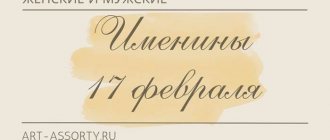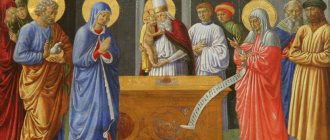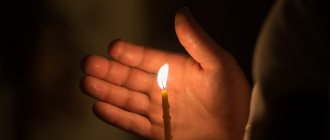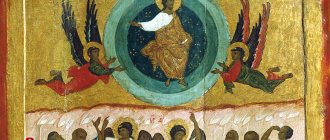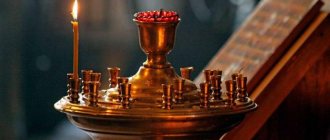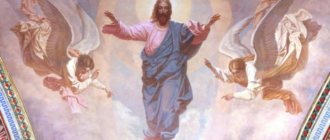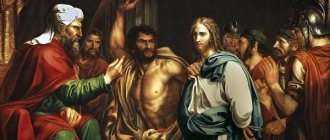"Save me, God!".
Thank you for visiting our website, before you start studying the information, please subscribe to our Orthodox community on Instagram, Lord, Save and Preserve † - https://www.instagram.com/spasi.gospodi/. The community has more than 400,000 subscribers. There are many of us like-minded people and we are growing quickly, we post prayers, sayings of saints, prayer requests, and timely post useful information about holidays and Orthodox events... Subscribe. Guardian Angel to you!
Good afternoon, brothers and sisters. We ask you to subscribe to our Orthodox page on Instagram https://www.instagram.com/spasi.gospodi/. We lead it with soul and we already have more than 400,000 subscribers. Join us. Guardian angel to you!
If we turn to Orthodox traditions, then one of the commandments requires observing the rule: work six days, and devote one to the thoughts and deeds of God. There are also church holidays when work is considered a sinful activity. So, on what Orthodox holidays can you not work?
What does the Bible tell us?
The fourth commandment in the Old Testament states that a believer must work 6 days a week, and on the last, seventh day, rest from work. Moses received such a covenant from the Lord when he communicated with him on the sacred Mount Sinai.
Find out what awaits you today - Horoscope for today for all zodiac signs
God taught the prophet that each of us must constantly work, receiving joy from the result of our activities. But on the seventh day you should give yourself physical and mental rest, focus on the spiritual, reflect on God and pray fervently.
What is the reason for this rule? According to the same Bible, the Creator created our world in 6 days, worked hard tirelessly, and on the seventh day he rested from work. Man is a creation of God, he must follow the example of the Creator: work like Him, and also rest.
At the same time, it is important to engage only in work that is constructive in nature and not destructive. After all, we are all children of the Creator.
If you are naturally lazy, afraid or don’t like to work, then think about this: the whole world around us exists solely thanks to the never-ending cycle of various things to do. And by being idle, a person becomes like a withering plant that will soon die.
Due to numerous requests from readers, we have prepared an “Orthodox Calendar” application for smartphones. Every morning you will receive information about the current day: holidays, fasts, days of remembrance, prayers, parables. Download for free: Orthodox Calendar 2022 (available on Android)
Our body also works, 24 hours a day. The heart never stops beating and pumping blood for a minute, the lungs fill the body with oxygen, and other organs work similarly. Therefore, it is important not to be afraid of work, to be able to work effectively, making sure to do the work to your satisfaction, and not just for the sake of generating income. After all, any activity that does not bring pleasure will sooner or later lead to collapse.
But do not forget and observe the biblical injunction about the need to abstain from work every seventh day of the week, and also on holidays. We'll find out what exactly it is next.
Traditions and rituals February 18, 2022
Agathia was considered a protector from fires. On this day, a loaf of bread was blessed in the church. In case of fire, pieces of bread were thrown into the field to put the fire aside, or into the flames to extinguish it.
The saint was also considered the patroness of livestock. They prayed to her on this holiday so that there would be enough food. On this day, bast shoes coated with tar were hung in the barn, and blessed bread was hung on the horns of the cows. It was believed that this would ward off the evil eye, death and pestilence.
In the old days they believed that on this day the death of a cow, an evil spirit, wanders around the area. To scare him away, the entire village was plowed three times with a plow with sickles, lighted splinters and pokers. A widow teller was always harnessed to the plow. If any animal was encountered along the way, it was mercilessly killed. It was believed that the spirit of death was hiding in it.
There is no fasting - eating any food is allowed.
On which Orthodox holidays you can’t work?
In the church calendar, all holidays are divided into two categories:
- Twelfth holidays.
- Great holidays.
Let's start with the first category. There are 12 twelve holidays in total and they are of particular importance for believers. On these days, Christians remember significant events in the life of Jesus Christ and the Virgin Mary.
Mostly the twelfth church holidays fall on fixed dates, then they are called immovable. But for some holidays, the date changes annually, depending on the onset of Easter.
The twelfth holidays are divided into the Mother of God and the Lord. The Lord's for the Orthodox are of greater importance. When they fall on Sunday, the traditional church service is replaced with a festive liturgy. But when the feast of the Mother of God comes on Sunday, the Sunday service is combined with the holiday service, but the first service is considered more important.
Let's now look at all the twelve holidays in Orthodoxy:
- The Nativity of Christ is celebrated on January 7 in memory of the birth of the Savior.
- Epiphany (aka Epiphany) - celebrated on January 19, on this day Jesus Christ was baptized by John the Baptist in the waters of the Jordan River.
- The Presentation of the Lord falls on February 15th. This is 40 days from the date of Christmas, then Mary and Joseph brought the baby Jesus to the temple of the Lord for the first time.
- Annunciation - celebrated on April 7 in memory of the Holy Virgin Mary receiving good news from her pregnancy, which was brought by the angel Gabriel.
- Palm Sunday falls on the last Sunday before Easter. On this day they remember the Savior’s solemn visit to Jerusalem. The symbol of the holiday is palm and willow branches.
- The Ascension of the Lord falls on the 40th day after Easter. Memory of the Savior's ascension to heaven.
- Holy Trinity falls on the 50th day after Easter. Commemoration of the descent of the Holy Spirit on the followers of Christ.
- Transfiguration of the Lord - the date of the holiday is August 19. On this day, the holy apostles, praying on the mountain, saw the greatness and glory of Christ.
- Dormition of the Blessed Virgin Mary - date August 28. On this day the Mother of God was buried. All the followers of Christ gathered for her funeral.
- The Nativity of the Blessed Virgin Mary falls on September 21st.
- The Exaltation of the Holy Cross - the date of the holiday is September 27. Celebrated in memory of the discovery of the cross on which Jesus Christ was crucified.
- The Entry of the Most Holy Theotokos into the Temple falls on December 4th. It is celebrated in memory of the dedication of little Mary to the Lord, when her parents gave her to be raised by the high priests.
Signs in Rus' regarding cleaning the house
The ancient Slavs had a lot of rules that seem strange to modern people. So, they had a whole series of signs about cleaning:
- if you do not open the window slightly while putting things in order, you can cause a major quarrel between family members;
- cleaning and parallel cooking means hunger;
- sweeping the rooms when one of the household members was on the move threatened disaster for the traveler;
- cleaning late in the evening or at night means quarrels with loved ones, loss of well-being.
The date for household chores was chosen very strictly. Housewives did not clean on major holidays. From generation to generation, they passed on knowledge about high-quality and safe cleaning that will not harm the well-being of the family.
Is it possible to work on church holidays?
This question has an ambiguous answer: it all depends on the circumstances. For example, if a person is forced to work on a holiday due to duty (for example, he is a doctor or a military man or a firefighter), then such activity is not considered a sinful activity. In addition, you can think about the Lord not only in the temple, but also from home or any other place.
However, if you do not have an urgent need to work, but you consciously decide to do dirty work on a holiday, then this is considered a sin.
Folk signs February 18, 2022
• Snowing on a frosty day means warming.
• Frosts on this day foreshadow a stormy spring, dry and hot summer.
• If it is frosty outside, the summer will be dry and warm.
• No snow - expect drought in the summer.
• If frost strikes, it is a sign that the summer will most likely be sultry.
• Water in rivers and wells rises - warming.
• Leather items (belts, clamps, reins) have become more flexible and soft - for snowfall.
• The forest became darker, as if it had turned black - towards the thaw.
• If it is warm on February 18, then there will be no more big ones.
• Frost on this day foreshadows a friendly spring, a dry and hot summer.
• Frosty day - spring will be early and warm, and there will be no rain in summer.
• No snow on February 18 – expect drought in the summer. If frost strikes, it is a sign that the summer will most likely be sultry.
• If it’s warm on Agafya, then winter is already over – we can expect spring.
• If the weather is frosty outside on February 18, then summer, according to signs, will be warm and without rain.
• February 18 is considered the day of remembrance of the dead. You should remember your deceased relatives and pray for their souls in the temple. One should pray especially earnestly for those who have died a violent death.
• You were not supposed to sleep on the night of Agafya, otherwise demons from hell would enter the house through the chimney. In order not to encounter the forces of darkness, the pipes were covered with clay, and the cracks were plugged with thistle flowers.
• A time of famine is coming for the peasants - by February 18, bread and feed were running out in almost every household.
What actions are prohibited on holidays?
Since the times of Kievan Rus, after the establishment of Christianity, there was a ban on doing housework on Orthodox holidays. Its observance was carefully monitored by government authorities. Markets and baths were closed on holidays, and people were encouraged to visit the temple.
And although times have changed a lot since then, the actions that cannot be performed on religious holidays remain unchanged:
- You cannot clean the house. You need to put things in order before the holiday so that your home is clean and comfortable.
- Can't be washed. Although in this case the prohibition is ambiguous: after all, if previously the process of washing clothes took a woman almost the whole day, today it takes a couple of seconds to press a button on a washing machine. But if it is not urgent, then it is better to abstain.
- Women are not allowed to do handicrafts: sewing, embroidery, knitting. And most of all, this prohibition applies to pregnant women, since an ancient sign says that they can “sew up” the mouth or eyes of an unborn baby.
- It is unacceptable to use foul language, judge other people, do evil or sin in any other way - this point is not even discussed.
- Do not abuse alcohol and food pleasures. After all, any holiday is designed to remind a person of the need for spiritual development and of God.
Signs and beliefs
The biggest holiday, Christmas, has many restrictions:
- Hunting and fishing are not allowed.
- Do not clean the room or do laundry.
- Do not allow the first woman to enter the home, because all the women in the family will get sick.
- On Candlemas it is not advised to leave home for a long time, because the trip will be unsuccessful.
- Seven days before Easter and on the holiday, you should refrain from any homework.
- Ascension is a great celebration. It is not allowed to work in the field, and it should be plowed after the holiday.
- On Trinity, any land and household work is not recommended.
The best article for you, go to: Christian holiday Epiphany
Why you can’t work on Orthodox holidays: It is usually said that those who do not observe the holidays will face failure, poverty and poor health. Traditions come and change. Only one person can decide what to do.
The Lord is always with you!
Signs associated with holidays
There is a list of signs relating to Christian holidays.
- On Paraskeva Friday (November 10) you cannot do needlework, but a woman should show off her items made earlier, over the past year. After all, Paraskeva Friday is considered the patroness of needlework.
- On St. Elijah's Day (August 2), swimming in a natural reservoir is prohibited. It is considered to be dangerous.
- On Vasily's Day (January 14), a man needs to be the first to enter the home, then there will be good luck in the house.
- On the day of remembrance of the death of John the Baptist (September 11), it is forbidden to cut round fruits and berries (such as watermelons, pumpkins), because the saint was beheaded.
- But on the day of the Holy Trinity, on the contrary, it is recommended to plant radishes - it is believed that then gardeners will receive a generous harvest. Housewives also bake pies on Trinity Sunday.
- On Spiritual Day (the next day after Trinity) they traditionally go in search of herbs, which, according to legend, acquire healing properties.
It can be summarized that the prohibitions associated with performing work on holidays are not too strict. Basically, they relate to an outdated way of life, when this or that activity required much more time and effort. Therefore, if you have an urgent need to do some household task on a holiday, complete it, but in such a way that it does not come at the expense of the spiritual aspect of life.
Interpretation of dreams February 18
A dream in which an official appeared warns that your new project will literally “drown” in red tape. In addition, you will understand that your views do not coincide with the opinions of your lover, which will lead to constant quarrels and entail a series of failures.
I dreamed of some wild tribe - in the near future you will quarrel with someone close to you.
If in your dream the action took place in the Middle Ages, then in reality adventures await you.
If you saw a white fluffy dog wagging its tail in a dream, changes for the better will soon occur in your life.
Prayer read on Christmas Eve before Christmas
Thy Nativity, Christ our God, rise up and the worldly light of reason in him, for those who serve the stars, learn to bow to Thee with the star, the Sun of truth, and lead Thee from the heights of the East. Lord, glory to You. It is worthy to eat as to truly bless Thee, the Mother of God, the Virgin Mary, the Ever-Blessed and Most Immaculate, and the Mother of our God. We magnify Thee, the most honorable Cherub and the most glorious without comparison, the Seraphim, who gave birth to God the Word without incorruptibility. On Your Nativity, Christ our God, let the light of knowledge about God shine, in it those who serve the stars (astronomers) were taught by the star itself how to worship You, the Sun of Truth, and recognize You from the heights of the East. Lord, glory to You. Worthy is he who truly magnifies You, the Mother of God, the Virgin Mary, the Ever-Blessed and Immaculate Mother of our God Jesus Christ.

